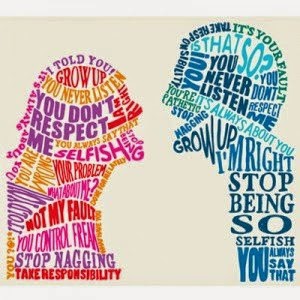When considering healthy
living and lifestyles, it is important to reflect on the health of a
relationship. As we grow and move through different stages of our lives, our
relationship needs tend to change and shift. With this change, you are more than
likely to experience a shift in actual relationships. – Have you ever lost
touch with someone close to you? Have you ever felt confused why jokes your
friends told you are just not as funny? Have you ever felt like as though only
a certain few individuals could truly understand what you are feeling? – We
begin to question our relationships as our needs change.
More specifically,
when considering basic needs, we are looking at what psychoanalytic clinicians
would refer to as dependency needs. These are needs within a
relationship that we cannot provide for ourselves and therefore must rely on
others for. We become dependent on other to fulfill our needs. You
are likely to observe reliance of others during infancy (feeding, bathing,
comfort, etc.) and in later adulthood when daily tasks become more challenging.
 Even as adults, we
continue to experience needs similar from childhood and adolescence. These
needs are companionship or belonging, verbal and physical affection, as
well as emotional support or validation. Specifically, within
romantic relationships, we search for partners who are good companions, are
emotionally supportive and provide affection. For couples engaged in healthy
romantic relationships, these needs are typically met. However, when an
individual’s needs are not met, they can become dissatisfied creating tension
and stress among couples. For those not involved in a partnership, their needs
are met in different ways. Strong connections with friends and family are good
sources to receive physical affections (hugs and embraces), validation and
praise. Those who know and understand us best are likely to provide these needs
that romantic partnerships would typically provide.
Even as adults, we
continue to experience needs similar from childhood and adolescence. These
needs are companionship or belonging, verbal and physical affection, as
well as emotional support or validation. Specifically, within
romantic relationships, we search for partners who are good companions, are
emotionally supportive and provide affection. For couples engaged in healthy
romantic relationships, these needs are typically met. However, when an
individual’s needs are not met, they can become dissatisfied creating tension
and stress among couples. For those not involved in a partnership, their needs
are met in different ways. Strong connections with friends and family are good
sources to receive physical affections (hugs and embraces), validation and
praise. Those who know and understand us best are likely to provide these needs
that romantic partnerships would typically provide.
As February is upon
us, many start to consider and evaluate relationships. Personal needs are
important aspects to consider within our relationships. However, there are
needs that we can strive to meet for ourselves, and there are
those needs we are dependent on others for. Within healthy relationships both
parties recognize the importance their role plays for those around them.
Whether you are single, engaged, married, separated, divorced or widowed,
everyone is capable of helping those around them meet their needs. Sometimes
the best way to improve a relationship is not looking at what you need, but
helping others meet their own.

